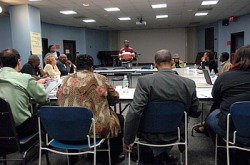About LinCS 2 Durham

Scientists are working to prevent the spread of the virus that causes AIDS but can’t do this alone. People at risk of HIV or who are living with the virus, community leaders, and health workers must be partners. To make a real difference, communities affected by HIV and scientists need to work together.
In the 1990s, the first Project LinCS: Linking Communities and Scientists brought people together in Durham and elsewhere to talk about HIV vaccines. LinCS 2 Durham HIV Prevention is building on that experience. It gives members of Durham’s Black community and scientists in the region a chance to work together on new ways to prevent HIV.
The LinCS 2 Durham partnership is a five-year research project that began in late 2008, undertaken by FHI, North Carolina Central University (NCCU), the Durham County Health Department (DCHD), the University of North Carolina at Chapel Hill Center for AIDS Research (UNC CFAR),and theUniversity of North Carolina at Chapel Hill (UNC). The National Institute of Nursing Research, part of the National Institutes of Health, is providing the funding for this study.
By bringing together researchers and community members, we’re accomplishing three goals:
1) We’re talking to people in the Durham community about medical research and HIV. Our goal is to help build support for new HIV-prevention work in the Black community and especially among people who have the highest chance of becoming infected. We want to find out what would encourage or discourage people from participating in HIV-prevention research. We want to understand concerns people have about HIV, medical care, and medical research. We want to work together to address those concerns.
2) We’re talking with the communities of young Black adults (ages 18 to 30) who have a higher chance of becoming infected with HIV. Most important, we want to understand what affects people’s trust in medicine, medical research, and public-health programs. Our goal is to understand these problems so that they can be solved.
3) We’re bringing community members and scientists together to decide jointly what research needs to be done to prevent HIV in the Black community. Members of Durham’s Black community and researchers are forming a strong team. Working together, we’ll identify one or more HIV-prevention studies to plan and pursue.
LinCS 2 Durham does not involve any medical or experimental research. Instead, this project does provide communities and scientists the opportunity to talk, listen, and learn from one another in order to direct the course of future HIV-prevention studies.
In the 1990s, the first Project LinCS: Linking Communities and Scientists brought people together in Durham and elsewhere to talk about HIV vaccines. LinCS 2 Durham HIV Prevention is building on that experience. It gives members of Durham’s Black community and scientists in the region a chance to work together on new ways to prevent HIV.
The LinCS 2 Durham partnership is a five-year research project that began in late 2008, undertaken by FHI, North Carolina Central University (NCCU), the Durham County Health Department (DCHD), the University of North Carolina at Chapel Hill Center for AIDS Research (UNC CFAR),and theUniversity of North Carolina at Chapel Hill (UNC). The National Institute of Nursing Research, part of the National Institutes of Health, is providing the funding for this study.
By bringing together researchers and community members, we’re accomplishing three goals:
1) We’re talking to people in the Durham community about medical research and HIV. Our goal is to help build support for new HIV-prevention work in the Black community and especially among people who have the highest chance of becoming infected. We want to find out what would encourage or discourage people from participating in HIV-prevention research. We want to understand concerns people have about HIV, medical care, and medical research. We want to work together to address those concerns.
2) We’re talking with the communities of young Black adults (ages 18 to 30) who have a higher chance of becoming infected with HIV. Most important, we want to understand what affects people’s trust in medicine, medical research, and public-health programs. Our goal is to understand these problems so that they can be solved.
3) We’re bringing community members and scientists together to decide jointly what research needs to be done to prevent HIV in the Black community. Members of Durham’s Black community and researchers are forming a strong team. Working together, we’ll identify one or more HIV-prevention studies to plan and pursue.
LinCS 2 Durham does not involve any medical or experimental research. Instead, this project does provide communities and scientists the opportunity to talk, listen, and learn from one another in order to direct the course of future HIV-prevention studies.